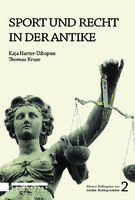Sport und Recht in der Antike
Contributor(s)
Harter-Uibopuu, Kaja (editor)
Mitthof, Fritz (editor)
Collection
Austrian Science Fund (FWF)Language
French; Italian; English; GermanAbstract
The volume deals with the juridical and institutional framework of athletic and artistic games from archaic Greece to late antique Rome. The agones’ rules and regulations, the funding by public contributions and wealthy private sponsors were approached as well as the athletes’ training and prizes and privileges, which determined the athletes’—and especially the winner’s— social status. Moreover attention was drawn onto the end of the classical Greek agones from a Roman perspective.The Second Vienna Colloquium on Ancient Legal History addressed the juridical and institutional framework of athletic and artistic games in classical antiquity. The chronological frame ranged from Archaic times to Late Antiquity (8th cent. BCE – 6th cent. CE). The symposium covered three main areas of interest. Firstly, the agones’ rules and regulations, the funding by public contributions and wealthy private sponsors as well as the athletes’ training were approached. Prizes and privileges, which determined the athletes’—and especially the winner’s— social status and were thus crucial to the agones’ appeal, were then attended to by several papers. In contrast to the conditions under the Imperium Romanum, where the emperor enforced nation-wide regulations, the „politics of sports“ followed different rules in the small-scaled world of the classical Greek poleis. Thus, differences in the conception of sports between Greeks and Romans were traced and exemplarily demonstrated on the basis of the gladiatorial games. Lastly, attention was drawn onto the end of the classical Greek agones from a Roman perspective. The now Christian empire couldn’t tolerate the pagan agones anymore and instead developed new forms of athletic competitions and public entertainment: late antique circus games and chariot races. Der Band widmet sich den rechtlichen und institutionellen Rahmenbedingungen athletischer und künstlerischer Wettkämpfe vom archaischen Griechenland bis in das spätantike Rom. Das Regelwerk der agone, die Finanzierung durch öffentliche Förderungen und reiche Privatsponsoren wurden ebenso angesprochen wie das Training der Athleten und Siegespreise und Privilegien, die den sozialen Status der Athleten, im Besonderen der Sieger, determinierten. Darüber hinaus wurde die Aufmerksamkeit auf das Ende der klassischen griechischen agone aus römischer Perspektive gelenkt.Der vorliegende Band des zweiten Wiener Kolloquium zur Antiken Rechtsgeschichte widmet sich den rechtlichen und institutionellen Rahmenbedingungen der sportlichen und musischen Wettkämpfe des klassischen Altertums. Der zeitliche Rahmen erstreckt sich von der Archaik bis in die Spätantike (8. Jh. v.Chr. – 6. Jh. n.Chr.). Das Regelwerk der Agone, ihre Finanzierung sowohl aus öffentlichen Mitteln wie auch aus privaten Zuwendungen vermögender Sponsoren und die Ausbildung der Sportler bilden den ersten Schwerpunkt. Siegespreise und Privilegien, die den sozialen Status von Sportlern und insbesondere Wettkampfsiegern bestimmten und für die Attraktivität der Agone ausschlaggebend waren, stehen im Mittelpunkt weiterer Beiträge. Derartige Fragen waren stets Gegenstand einer „Sportpolitik“, die unter den kleinräumigen Gegebenheiten der klassischen griechischen Stadtstaaten anderen Spielregeln folgte als etwa im Imperium Romanum, wo der Kaiser versuchte uniforme, reichsweite Bestimmungen durchzusetzen. Unterschiede im Konzept von Sport und Wettkampf bei Griechen und Römern werden aufgespürt und unter anderem anhand der Gladiatorenspiele als einem spezifisch römischem Sonderfall illustriert. Ein weiterer Aspekt ist der Blick auf das Ende der klassischen griechischen Agonistik aus der römischen Perspektive: Das christlich gewordene Kaisertum duldete die heidnischen Agone nicht mehr, entwickelte aber gleichzeitig mit den spätantiken Zirkusspielen und ihren Wagenrennen und Tierhatzen neue Formen des Wettkampfs und der Volksbelustigung.
Keywords
Ancient History, Ancient Sports, Greek Law, Roman Law; Alte Geschichte, Antiker Sport, Griechisches Recht, Römisches RechtDOI
10.15661/series/kollarg/sportundrechtISBN
9783902976147OCN
945782784Publisher
HolzhausenPublisher website
https://www.verlagholzhausen.at/Publication date and place
2014Grantor
Classification
History


 Download
Download